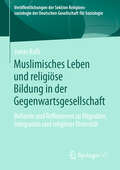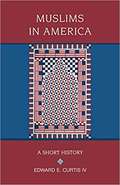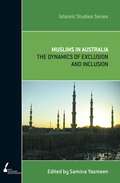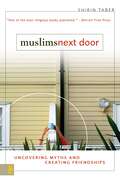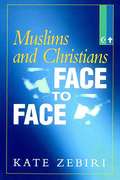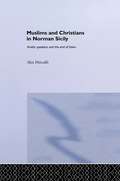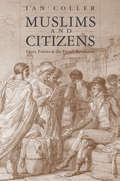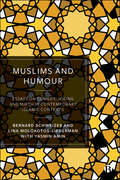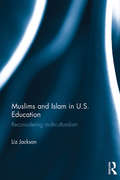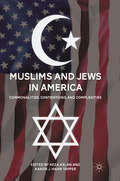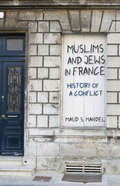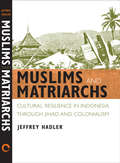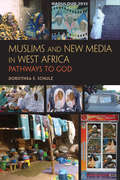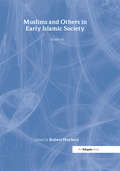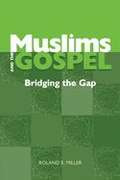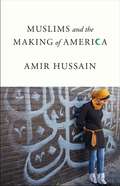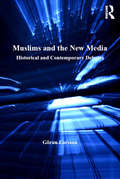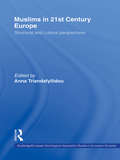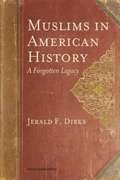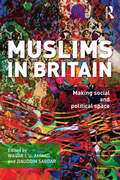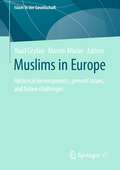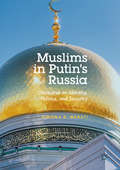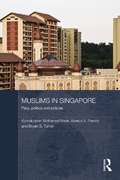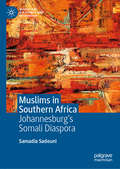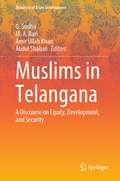- Table View
- List View
Muslimisches Leben und religiöse Bildung in der Gegenwartsgesellschaft: Befunde und Reflexionen zu Migration, Integration und religiöser Diversität (Veröffentlichungen der Sektion Religionssoziologie der Deutschen Gesellschaft für Soziologie)
by Jonas KolbDas Buch befasst sich mit zwei Themen, die eng miteinander verwoben sind: muslimisches Leben und islamische Bildung. Die in diesem Band versammelten Aufsätze liefern zum einen tiefgreifende religionssoziologische Einblicke in die Bandbreite und Vielschichtigkeit der muslimischen Glaubenspraxis, die unterschiedlichen Dimensionen von Religiosität im Alltag und die Ausprägungen muslimischer Lebenswelten in der deutschsprachigen Gegenwartsgesellschaft. Zum anderen werden die empirischen Analysen für Bildungskontexte, die islamische Religionspädagogik, den islamischen Religionsunterricht, die verschiedenen Lernorte islamischer Bildung, interreligiöse Lehr- und Lernkonstellationen sowie die Lehrer*innenbildung im Generellen fruchtbar gemacht. Die Aufsatzsammlung entwickelt in diesem Zusammenhang gegenwärtige bildungswissenschaftliche Ansätze zu den Themen Schule, Bildung und Pädagogik vor dem Hintergrund migrationsbedingter Prozesse weiter. Mit der systematischen Verschränkung von religionssoziologischen Befunden und bildungsbezogenen Analysen betritt das vorliegende Buch wissenschaftliches Neuland. Der Empirie, empirischen Forschungsmethoden und Erkenntnissen wird damit als wesentlichen Grundlagen theoretischer Reflexionen im Bereich der islamisch-theologischen Studien die gebührende Anerkennung verschafft.
Muslims In America: A Short History
by Edward E. Curtis IVMuslims are neither new nor foreign to the United States. They have been a vital presence in North America since the 16th century. Muslims in America unearths their history, documenting the lives of African, Middle Eastern, South Asian, European, black, white, Hispanic and other Americans who have been followers of Islam. <p><p> The book begins with the tale of Job Ben Solomon, a 18th century African American Muslim slave, and goes on to chart the stories of sodbusters in North Dakota, African American converts to Islam in the 1920s, Muslim barkeepers in Toledo, the post-1965 wave of professional immigrants from Asia and Africa, and Muslim Americans after 9/11. The book reveals the richness of Sunni, Shi'a, Sufi and other forms of Islamic theology, ethics, and rituals in the United States by illustrating the way Islamic faith has been imagined and practiced in the everyday lives of individuals. <p><p> Muslims in America recovers the place of Muslims in the larger American story, too. Showing how Muslim American men and women participated in each era of U.S. history, the book explores how they have both shaped and have been shaped by larger historical trends such as the abolition movement, Gilded Age immigration, the Great Migration of African Americans, urbanization, religious revivalism, the feminist movement, and the current war on terror. It also shows how, from the very beginning of American history, Muslim Americans have been at once a part of their local communities, their nation, and the worldwide community of Muslims. <p><p> The first single-author history of Muslims in America from colonial times to the present, this book fills a huge gap and provides invaluable background on one of the most poorly understood groups in the United States. <p><p> Religion in American Life explores the evolution, character, and dynamic of organized religion in America from 1500 to the present day. Written by distinguished historians of religion, these books weave together the varying stories that compose the religious fabric of the United States, from Puritanism to alternative religious practices. Primary source material coupled with handsome illustrations and lucid text make these books essential in any exploration of America's diverse nature. Each book includes a chronology, suggestions for further reading, and an index.
Muslims In Australia: The Dynamics of Exclusion and Inclusion (Islamic Studies Series)
by Samina YasmeenMuslims in Australia have attracted increased attention as citizens in the last decade. The research scholars in this book present a complex and dynamic picture of their presence and experiences in Australia, taking us far beyond simplistic notions of security threats and discrimination.Their contributions reveal that Muslims and non-Muslims, as individuals and communities, display many different attitudes towards each other and towards many issues, including reactions to the media, threats of terrorism and access to Islamic schools.The non-Muslim community does not always set the agenda for these interactions: Muslims experience exclusion while excluding others at the same time, often other Muslims. Muslims in Australia portrays the varied ways in which Muslims traverse spaces of inclusion and exclusion, and suggests ideas to encourage and sustain acceptance and social cohesion. Islamic Studies Series - Volume 6
Muslims Next Door: Uncovering Myths and Creating Friendships
by Shirin TaberThis insider’s view of how North American Muslims think and live goes beyond false stereotypes and provides practical suggestions on how to establish friendships that can point to Christ. Since September 11, 2001, Americans are more curious about the followers of Islam. We can no longer afford to be ignorant of such an influential and historical world religion. Muslims Next Door dispels commonly held myths and helps readers to better understand how Muslims think. Author Shirin Taber comes from a multicultural background and has lived in Iran, France, and Turkey, and now in the United States. Stories of her experiences as well as from interviews with Muslims help readers understand the human side of Islam. Each chapter contains questions for reflection to use in group settings. The book also includes a glossary of Islamic terms.
Muslims and Christians Face to Face
by Kate ZebiriKate Zebiri analyses modern Muslim writings on Christianity and Christian writings on Islam to explore the issues central to Muslim-Christian relations.
Muslims and Christians in Norman Sicily: Arabic-Speakers and the End of Islam (Culture and Civilization in the Middle East)
by Alex Metcalfe Dr Alexander MetcalfeThe social and linguistic history of medieval Sicily is both intriguing and complex. Before the Muslim invasion of 827, the islanders spoke dialects of either Greek or Latin or both. On the arrival of the Normans around 1060 Arabic was the dominant language, but by 1250 Sicily was an almost exclusively Christian island, with Romance dialects in evidence everywhere. Of particular importance to the development of Sicily was the formative period of Norman rule (1061 1194), when most of the key transitions from an Arabic-speaking Muslim island to a 'Latin'-speaking Christian one were made. This work sets out the evidence for those changes and provides an authoritative approach that re-defines the conventional thinking on the subject.
Muslims and Citizens: Islam, Politics, and the French Revolution
by Ian CollerA groundbreaking study of the role of Muslims in eighteenth‑century France From the beginning, French revolutionaries imagined their transformation as a universal one that must include Muslims, Europe&’s most immediate neighbors. They believed in a world in which Muslims could and would be French citizens, but they disagreed violently about how to implement their visions of universalism and accommodate religious and social difference. Muslims, too, saw an opportunity, particularly as European powers turned against the new French Republic, leaving the Muslim polities of the Middle East and North Africa as France&’s only friends in the region. In Muslims and Citizens, Coller examines how Muslims came to participate in the political struggles of the revolution and how revolutionaries used Muslims in France and beyond as a test case for their ideals. In his final chapter, Coller reveals how the French Revolution&’s fascination with the Muslim world paved the way to Napoleon&’s disastrous invasion of Egypt in 1798.
Muslims and Humour: Essays on Comedy, Joking, and Mirth in Contemporary Islamic Contexts
by Bernard SchweizerThis thought-provoking collection offers a multi-disciplinary approach on the subject of humour, Muslims, and Islam. Beginning with theoretical perspectives and scriptural guidance on permissible and restricted humour, the volume presents a variety of case studies about Muslim comedic practices in various cultural, political, and religious contexts. This unprecedented scholarship sheds new light on common misconceptions about humour and laughter in Islam and deftly tackles sensitive themes from blasphemy to freedom of speech. Chapter 9 is available Open Access via OAPEN under CC-BY-NC-ND licence.
Muslims and Islam in U.S. Education: Reconsidering multiculturalism
by Liz JacksonWinner of Philosophy of Education Society of Australasia (PESA)'s inaugural PESA Book Awards in 2015, and The University of Hong Kong Research Output Prize for Education 2014-15. Muslims and Islam in U.S. Education explores the complex interface that exists between U.S. school curriculum, teaching practice about religion in public schools, societal and teacher attitudes toward Islam and Muslims, and multiculturalism as a framework for meeting the needs of minority group students. It presents multiculturalism as a concept that needs to be rethought and reformulated in the interest of creating a more democratic, inclusive, and informed society. Islam is an under-considered religion in American education, due in part to the fact that Muslims represent a very small minority of the population today (less than 1%). However, this group faces a crucial challenge of representation in United States society as a whole, as well as in its schools. Muslims in the United States are impacted by ignorance that news and opinion polls have demonstrated is widespread among the public in the last few decades. U.S. citizens who do not have a balanced, fair and accurate view of Islam can make a variety of decisions in the voting booth, in job hiring, and within their small-scale but important personal networks and spheres of influence, that make a very negative impact on Muslims in the United States. This book presents new information that has implications for curricula, religious education, and multicultural education today, examining the unique case of Islam in U.S. education over the last 20 years. Chapters include: Perspectives on Multicultural Education 9/11, the Media, and the New Need to Know Islam and Muslims in Public Schools Blazing a Path for Intercultural Education This book is an essential resource for professors, researchers, and teachers of social studies, particularly those involved with multicultural issues, critical and sociocultural analysis of education and schools; as well as interdisciplinary scholars and students in anthropology and education.
Muslims and Jews in America
by Reza Aslan Aaron J. Hahn TapperThis book is an exploration of contemporary Jewish-Muslim relations in the United States and the distinct ways in which these two communities interact with one another in the American context. Each essay discusses a different episode from the recent twentieth and current twenty-first century American milieu that links these two groups together.
Muslims and Jews in France: History of a Conflict
by Maud S. MandelThis book traces the global, national, and local origins of the conflict between Muslims and Jews in France, challenging the belief that rising anti-Semitism in France is rooted solely in the unfolding crisis in Israel and Palestine. Maud Mandel shows how the conflict in fact emerged from processes internal to French society itself even as it was shaped by affairs elsewhere, particularly in North Africa during the era of decolonization. Mandel examines moments in which conflicts between Muslims and Jews became a matter of concern to French police, the media, and an array of self-appointed spokesmen from both communities: Israel's War of Independence in 1948, France's decolonization of North Africa, the 1967 Arab-Israeli War, the 1968 student riots, and François Mitterrand's experiments with multiculturalism in the 1980s. She takes an in-depth, on-the-ground look at interethnic relations in Marseille, which is home to the country's largest Muslim and Jewish populations outside of Paris. She reveals how Muslims and Jews in France have related to each other in diverse ways throughout this history--as former residents of French North Africa, as immigrants competing for limited resources, as employers and employees, as victims of racist aggression, as religious minorities in a secularizing state, and as French citizens. In Muslims and Jews in France, Mandel traces the way these multiple, complex interactions have been overshadowed and obscured by a reductionist narrative of Muslim-Jewish polarization.
Muslims and Matriarchs: Cultural Resilience in Indonesia through Jihad and Colonialism
by Jeffrey HadlerMuslims and Matriarchs is a history of an unusual, probably heretical, and ultimately resilient cultural system. The Minangkabau culture of West Sumatra, Indonesia, is well known as the world's largest matrilineal culture; Minangkabau people are also Muslim and famous for their piety. In this book, Jeffrey Hadler examines the changing ideas of home and family in Minangkabau from the late eighteenth century to the 1930s.Minangkabau has experienced a sustained and sometimes violent debate between Muslim reformists and preservers of indigenous culture. During a protracted and bloody civil war of the early nineteenth century, neo-Wahhabi reformists sought to replace the matriarchate with a society modeled on that of the Prophet Muhammad. In capitulating, the reformists formulated an uneasy truce that sought to find a balance between Islamic law and local custom. With the incorporation of highland West Sumatra into the Dutch empire in the aftermath of this war, the colonial state entered an ongoing conversation. These existing tensions between colonial ideas of progress, Islamic reformism, and local custom ultimately strengthened the matriarchate.The ferment generated by the trinity of oppositions created social conditions that account for the disproportionately large number of Minangkabau leaders in Indonesian politics across the twentieth century. The endurance of the matriarchate is testimony to the fortitude of local tradition, the unexpected flexibility of reformist Islam, and the ultimate weakness of colonialism. Muslims and Matriarchs is particularly timely in that it describes a society that experienced a neo-Wahhabi jihad and an extended period of Western occupation but remained intellectually and theologically flexible and diverse.
Muslims and New Media in West Africa
by Dorothea E. SchulzAlthough Islam is not new to West Africa, new patterns of domestic economies, the promise of political liberalization, and the proliferation of new media have led to increased scrutiny of Islam in the public sphere. Dorothea E. Schulz shows how new media have created religious communities that are far more publicly engaged than they were in the past. Muslims and New Media in West Africa expands ideas about religious life in West Africa, women's roles in religion, religion and popular culture, the meaning of religious experience in a charged environment, and how those who consume both religion and new media view their public and private selves.
Muslims and Others in Early Islamic Society (The Formation of the Classical Islamic World #18)
by Robert HoylandThe interaction between Muslims and the other religious denominations of the Middle East in the period 620-1020 is the subject of this volume. This is arguably the single most important issue in the history of the early Islamic Middle East, since the Muslims were initially a minority in the lands that they had conquered and so had to reach some modus vivendi with the various religious communities in their realm. Fifteen articles by leading scholars shed light on this process from a number of different perspectives: historical, conceptual, legal, social and theological. An introduction both gives an overview and examines possibilities for future research. The period under study is demarcated at one end by the Prophet Muhammed (d. 632) who, as the Qur’an tells us, had to deal with Jews, Christians and polytheists. At the other end lies the great legal/political thinker Manardi (d. ca. 1020), by whose time the Middle East had become substantially Islamicised.
Muslims and the Gospel Bridging the Gap: A Reflection on Christian Sharing
by Roland E. MillerMuslims and the Gospel: Bridging the Gap offers a striking and perceptive study of the major mission task of our time. Christians have become aware that Muslims and the gospel need to be brought together, but have been confused about how that might be done. That is the question this book answers. It meets a crucial need at a crucial time. Roland Miller draws on a lifetime of experience, using an abundance of illustrations, as he develops the theme of bridging the gap. He does this in three parts-the Context, the Bridges, the Task.
Muslims and the Making of America
by Amir HussainHussain chronicles the history of Islam in America to underscore the valuable cultural influence of Muslims on American life. He then rivets attention on music, sports, and culture as key areas in which Muslims have shaped and transformed American identity. America, Hussain concludes, would not exist as it does today without the essential contributions made by its Muslim citizens.
Muslims and the New Media: Historical and Contemporary Debates
by Göran LarssonScholars from an extensive range of academic disciplines have focused on Islam in cyberspace and the media, but there are few historical studies that have outlined how Muslim 'ulama' have discussed and debated the introduction and impact of these new media. Muslims and the New Media explores how the introduction of the latest information and communication technologies are mirroring changes and developments within society, as well as the Middle East's relationship to the West. Examining how reformist and conservative Muslim 'ulama' have discussed the printing press, photography, the broadcasting media (radio and television), the cinema, the telephone and the Internet, case studies provide a contextual background to the historical, social and cultural situations that have influenced theological discussions; focusing on how the 'ulama' have debated the 'usefulness' or 'dangers' of the information and communication media. By including both historical and contemporary examples, this book exposes historical trajectories as well as different (and often contested) positions in the Islamic debate about the new media.
Muslims in 21st Century Europe: Structural and Cultural Perspectives (Studies in European Sociology)
by Anna TriandafyllidouMuslims in 21st Century Europe explores the interaction between native majorities and Muslim minorities in various European countries with a view to highlighting different paths of integration of immigrant and native Muslims. Starting with a critical overview of the institutionalisation of Islam in Europe and a discussion on the nature of Muslimophobia as a social phenomenon, this book shows how socio-economic, institutional and political parameters set the frame for Muslim integration in Europe. Britain, France, Germany, the Netherlands, and Sweden are selected as case studies among the 'old' migration hosts. Italy, Spain and Greece are included to highlight the issues arising and the policies adopted in southern Europe to accommodate Muslim claims and needs. The book highlights the internal diversity of both minority and majority populations, and analyses critically the political and institutional responses to the presence of Muslims.
Muslims in American History: A Forgotten Legacy
by Jerald DirksThe book pays homage to one such forgotten legacy--the role of Muslims in American history. By offering a review based on various scholarly sources, the book broadens the understanding of American public with regard to the substantial role played by Muslims throughout American history.
Muslims in Britain: Making Social and Political Space
by Ziauddin Sardar Waqar I. U. AhmadThe management of social, religious and ethnic diversity is a key social policy concern in Britain, and Muslims in particular have become a focus of attention in recent years. This timely and topical volume examines the position of Muslims in Britain and how they are changing and making social, political and religious space. With contributions from world renowned scholars on British Muslims and from policy makers writing on issues of concern to Muslims and others alike, the book explores how British Muslims are changing social and religious spaces such as mosques and the role of women, engaging in politics, creating media and other resources, and thus developing new perspectives on Islam and transforming Muslim society from within. Chapters cover issues of religion and politics, Britishness, governance, parallel lives, gender issues, religion in civic space, ethnicity, and inter ethnic and religious relations, as well as the role of intellectuals, chaplains and activists in reforming Islam and renovating the British political landscape. Providing a broad and comprehensive examination of the key issues surrounding Muslims in the UK, this book will be a valuable resource for students, lecturers and researchers in sociology, social policy, geography, politics, Islamic studies and other related disciplines.
Muslims in Europe: Historical developments, present issues, and future challenges (Islam in der Gesellschaft)
by Rauf Ceylan Marvin MückeSince the migration movements from Islamic countries, a Muslim diaspora has developed in many Western societies. While in classical Islamic theology residence in non-Muslim countries has always been a controversial issue, in the course of globalization and internationalization processes the classical distinction between "Islamic world" and "non-Islamic world" has been put into perspective. Now nearly 30 million Muslims live in Europe. The book offers an overview over Muslim communities in Europe, their history, present issues, and future challenges.
Muslims in Putin's Russia
by Simona E. MeratiThis book offers a novel interpretation of Russian contemporary discourse on Islam and its influence on Russian state policies. It shifts the analytical perspective from the discussion about Russia's Islam as a potential security threat to a more comprehensive view of the relationships of Muslims with Russia as a state and a civilization. The work demonstrates how many Muslims increasingly express a sense of belonging to Russia and are increasingly willing to contribute to state building processes.
Muslims in Singapore: Piety, politics and policies (Routledge Contemporary Southeast Asia Series #26)
by Bryan S. Turner Kamaludeen Mohamed Nasir Alexius A. PereiraThis book examines Muslims in Singapore, analysing their habits, practices and dispositions towards everyday life, and also their role within the broader framework of the secularist Singapore state and the cultural dominance of its Chinese elite, who are predominantly Buddhist and Christian. Singapore has a highly unusual approach to issues of religious diversity and multiculturalism, adopting a policy of deliberately ‘managing religions’ - including Islam - in an attempt to achieve orderly and harmonious relations between different racial and religious groups. This has encompassed implicit and explicit policies of containment and ‘enclavement’ of Muslims, and also the more positive policy of ‘upgrading’ Muslims through paternalist strategies of education, training and improvement, including the modernisation of madrassah education in both content and orientation. This book examines how this system has operated in practice, and evaluates its successes and failures. In particular, it explores the attitudes and reactions of Muslims themselves across all spheres of everyday life, including dining and maintaining halal-vigilance; education and dress code; and practices of courtship, sex and marriage. It also considers the impact of wider international developments, including 9/11, fear of terrorism and the associated stigmatization of Muslims; and developments within Southeast Asia such as the Jemaah Islamiah terrorist attacks and the Islamization of Malaysia and Indonesia. This study has more general implications for political strategies and public policies in multicultural societies that are deeply divided along ethno-religious lines.
Muslims in Southern Africa: Johannesburg’s Somali Diaspora (Migration, Diasporas and Citizenship)
by Samadia SadouniThis book presents a socio-historical analysis of the Somali Muslim diaspora in Johannesburg and its impact on urban development in the context of Somali migrations in the Southern African Indian Ocean region from the end of the 19th Century to today. The author draws on a combination of archival and ethnographic research to examine the interlocking processes of migration, urban place-making, economic entrepreneurship and transnational mobility through the lens of religious practice and against the background of historical interactions between the Somali diaspora and the British and Ottoman Empires. Comparison with other Muslim diasporas in the region, primarily Indians, adds further depth to an investigation which will shed new light on the Somali experience of mobility and the urban development of South Africa across its colonial, apartheid and democratic periods. The politics of race, imperial and post-imperial identities, and religious community governance are shown to be key influencing factors on the Somali diaspora in Johannesburg. This sophisticated analysis will provide a valuable resource for students and scholars of urban geography, the sociology of religion, and African, race, ethnic and migration studies.
Muslims in Telangana: A Discourse on Equity, Development, and Security (Dynamics of Asian Development)
by Abdul Shaban G. Sudhir M. A. Bari Amir Ullah KhanThis book analyses the state of development of Muslims at the regional level. It explains the linkages between the findings of global, national, and state-level studies with regard to the current status of Muslims and broadens understanding of Muslims and their participation in virtually all major sectors, including the economy, housing, demography, health, migration, state policy, and affirmative action. The book presents the challenges faced by the community and reflects upon the socio-economic and educational conditions of Muslims in Telangana State. It presents a comparative analysis of mortality data, maternal health, delivery care, and child immunization, as well as reproductive health aspects and children’s nutritional status. It shares valuable insights into the impacts of emigration and internal migration on health among local Muslims and presents a detailed analysis of data from the Census of India, NSSO, and Commission of Inquiry on Socio-Economic and Educational Status of Muslims regarding the social, economic, and demographic situation of Muslims in Telangana, as well as their opportunities for development under the newly formed state government. The book would be of great interest to scholars and researchers in development economics, sociology, politics, history, cultural studies, minority studies, Islamic studies, and policy studies, as well as policymakers, civil society activists, and those working in media and journalism.
